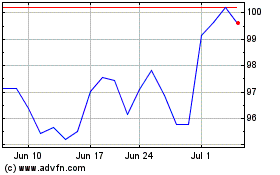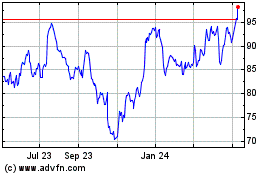- Majority of global asset managers (78%) and asset owners (80%)
expect sustainable assets to increase over next two years
- Nearly 90% of institutional investors say sustainable investing
activities are driven by client and external stakeholder
demands
- Top challenges to sustainable investing include data
availability, political and regulatory environment, and
greenwashing
- Institutional investors have mixed views on use of carbon
offsets as part of investees’ decarbonization strategy
Most institutional investors expect assets in sustainable funds
to grow in the next two years, according to a new “Sustainable
Signals” report by the Morgan Stanley Institute for Sustainable
Investing. The survey, which polled more than 900 institutional
investors across North America, Europe and Asia Pacific in July and
August 2024, assesses attitudes of asset owners and asset managers
toward sustainable investing, as well as emerging trends in the
space.
The majority of asset managers (78%) expect AUM in sustainable
funds to increase over the next two years, driven by a combination
of new mandates and higher allocations from existing clients.
Similarly, 80% of asset owners expect the proportion of their
assets allocated to sustainable investment options to increase
during the same period. More than three-quarters of asset owners
“strongly” or “somewhat” agree that sustainable investing offerings
influence mandate decisions, with 80% requiring their asset
managers to have a sustainable investing policy or strategy in
place.
“Institutional investors see a growth trajectory for sustainable
assets globally in the coming years to meet increasing client and
stakeholder demands in a more mature sustainable investing market,”
said Jessica Alsford, Chief Sustainability Officer and Chair of the
Institute for Sustainable Investing at Morgan Stanley. “This year
the Institute has released Sustainable Signals reports with views
from individual investors, corporates and institutional investors,
with each group seeing sutainability as an opportunity for growth
and value creation.”
Other key survey findings include:
- Challenges and Concerns – The top reported challenge in
sustainable investing for both asset owners and managers is data
availability (71%), followed by fluctuating regulatory guidance
(69%) and greenwashing (68%). APAC investors cite challenges at
higher rates than European and North American counterparts, with
particular concerns around the burden of disclosure requirements
for investors (71%).
- Sustainable Investment Themes and Solutions – Globally,
institutional investors prioritize investments in healthcare (41%)
and financial inclusion (40%). Regional differences emerged when
asked about investment priorities for specific sustainable
solutions, with European investors ranking nature and biodiversity
solutions higher for example. Notably, climate adaptation solutions
are seen as one of the most underappreciated investment
opportunities across all regions.
- Net-Zero Targets – Close to two-thirds of asset owners
and managers have set a net-zero target, with almost all saying
they have a plan to deliver their target. About 2% of institutional
investors are reportedly already at net zero.
When it comes to assessing the use of carbon offsets,
institutional investors have mixed views. Nearly 40% of asset
owners currently use carbon offsets to mitigate portfolio
emissions, and 31% of asset managers offer clients offsets linked
to specific products or aggregated emissions. But while some
consider offsets a valid approach to decarbonization (32% of asset
owners, 31% of asset managers), others think they should only be
used for hard-to-abate emissions (21% of asset owners, 22% of asset
managers). Still others are cautious about the use of offsets and
are waiting for greater certainty (28% of asset owners, 27% of
asset managers).
The Sustainable Signals series was launched in 2015 and measures
the views of individual investors, instititutional investors and
corporates on sustainable investing. View the full results of the
latest survey here.
About Morgan Stanley
Morgan Stanley (NYSE: MS) is a leading global financial services
firm providing a wide range of investment banking, securities,
wealth management and investment management services. With offices
in 42 countries, the Firm’s employees serve clients worldwide
including corporations, governments, institutions and individuals.
For further information about Morgan Stanley, please visit
www.morganstanley.com.
About Morgan Stanley Institute for Sustainable
Investing
The Morgan Stanley Institute for Sustainable Investing (The
Institute) builds scalable finance solutions that seek to deliver
competitive financial returns while driving positive environmental
and social impact. The Institute creates innovative financial
products, thoughtful insights and capacity building programs that
help maximize capital to create a more sustainable future. For more
information about the Morgan Stanley Institute for Sustainable
Investing, visit www.morganstanley.com/sustainableinvesting.
Disclosures
This material was published in December 2024 and has been
prepared for informational purposes only and is not a solicitation
of any offer to buy or sell any security or other financial
instrument, or to participate in any trading strategy. This
material does not provide individually tailored investment advice.
It has been prepared without regard to the individual financial
circumstances and objectives of persons who receive it. Securities
discussed in this material may not be appropriate for all
investors. It should not be assumed that the securities
transactions or holdings discussed were or will be profitable.
Morgan Stanley recommends that investors independently evaluate
particular investments and strategies and encourages investors to
seek the advice of a Financial Advisor.
This material contains forward-looking statements and there can
be no guarantee that they will come to pass. Past performance is
not a guarantee of future results or indicative of future
performance.
Information contained in this material is based on data from
multiple sources and Morgan Stanley makes no representation as to
the accuracy or completeness of data from sources outside of Morgan
Stanley.
Morgan Stanley makes every effort to use reliable, comprehensive
information, but we make no guarantee that it is accurate or
complete. We have no obligation to tell you when opinions or
information in this material may change.
Because of their narrow focus, sector investments tend to be
more volatile than investments that diversify across many sectors
and companies.
Certain portfolios may include investment holdings that consider
one or more Environmental, Social and Governance (“ESG”) factors
(referred to as “ESG investments”). For reference, environmental
("E") factors can include, but are not limited to, climate change,
water, waste, and biodiversity. Social ("S") factors can include,
but not are not limited to, employees, diversity & inclusion,
cyber security, data privacy, health & wellness, supply chains,
product safety & security, community engagement, and human
rights. Governance ("G") factors can include, but are not limited
to, board structure & oversight, leadership composition, pay
and incentive structures, corruption & bribery, ethics &
business conduct, shareholder rights, accounting & audit
practices, tax evasion, and risk management. You should carefully
review an investment product's prospectus or other offering
documents, disclosures and/or marketing material to learn more
about how it incorporates ESG factors into its investment
strategy.
ESG investments may also be referred to as sustainable
investments, impact aware investments, socially responsible
investments or diversity, equity, and inclusion (“DEI”)
investments. It is important to understand that ESG definitions and
criteria used within the industry can vary, and ESG ratings of the
same subject companies and/or securities can vary among different
ESG ratings providers for several reasons including, differences in
definitions, methodologies, processes, data sources and
subjectivity among ESG rating providers when determining a rating.
Certain issuers of investments including, but not limited to,
separately managed accounts (“SMAs”), mutual funds and exchange
traded funds (“ETFs”) may have differing and inconsistent views
concerning ESG criteria where the ESG claims made in offering
documents or other literature may overstate ESG impact. Further,
socially responsible norms vary by region, and an issuer’s ESG
practices or Morgan Stanley’s assessment of an issuer’s ESG
practices can change over time.
Portfolios that include investment holdings deemed ESG
investments or that employ ESG screening criteria as part of an
overall strategy may experience performance that is lower or higher
than a portfolio not employing such practices. Portfolios with ESG
restrictions and strategies as well as ESG investments may not be
able to take advantage of the same opportunities or market trends
as portfolios where ESG criteria is not applied. There is no
assurance that an ESG investing strategy or techniques employed
will be successful. Past performance is not a guarantee or a
dependable measure of future results. For risks related to a
specific fund, please refer to the fund's prospectus or summary
prospectus.
Investment managers can have different approaches to ESG and can
offer strategies that differ from the strategies offered by other
investment managers with respect to the same theme or topic.
Additionally, when evaluating investments, an investment manager is
dependent upon information and data that may be incomplete,
inaccurate, or unavailable, which could cause the manager to
incorrectly assess an investment’s ESG characteristics or
performance. Such data or information may be obtained through
voluntary or third-party reporting. Morgan Stanley does not verify
that such information and data is accurate and makes no
representation or warranty as to its accuracy, timeliness, or
completeness when evaluating an issuer.
Morgan Stanley makes no representation as to the compliance or
otherwise of any fund or portfolio with any laws or regulatory
guidelines, recommendations, requirements or similar relating to
the ESG characterization of any fund or portfolio, or in connection
with or to meet any of your investing ESG objectives, metrics, or
criteria.
The appropriateness of a particular ESG investment or strategy
will depend on an investor’s individual circumstances and
objectives. Principal value and return of an investment will
fluctuate with changes in market conditions.
There is no assurance that an ESG investing strategy or
techniques employed will be successful. Past performance is not a
guarantee or a dependable measure of future results.
Information contained in the material is based on data from
multiple sources and Morgan Stanley makes no representation as to
the accuracy or completeness of data from sources outside of Morgan
Stanley. References to third parties contained herein should not be
considered a solicitation on behalf of or an endorsement of those
entities by Morgan Stanley. Morgan Stanley is not responsible for
the information contained on any third-party web site or your use
of or inability to use such site, nor do we guarantee its accuracy
or completeness. The terms, conditions, and privacy policy of any
third-party web site may be different from those applicable to your
use of any Morgan Stanley web site. The opinions expressed by the
author of an article written by a third party are solely his/her
own and do not necessarily reflect those of Morgan Stanley. The
information and data provided by any third-party web site or
publication is as of the date of the article when it was written
and is subject to change without notice.
Artificial intelligence (AI) is subject to limitations, and you
should be aware that any output from an IA-supported tool or
service made available by the Firm for your use is subject to such
limitations, including but not limited to inaccuracy,
incompleteness, or embedded bias. You should always verify the
results of any AI-generated output.
Morgan Stanley Wealth Management is a business of Morgan Stanley
Smith Barney LLC.
© 2024 Morgan Stanley & Co. LLC and Morgan Stanley Smith
Barney LLC. Members SIPC.
View source
version on businesswire.com: https://www.businesswire.com/news/home/20241202555902/en/
Media Relations: Carrie Hall Carrie.Hall@morganstanley.com
Morgan Stanley (NYSE:MS)
Historical Stock Chart
From Dec 2024 to Jan 2025

Morgan Stanley (NYSE:MS)
Historical Stock Chart
From Jan 2024 to Jan 2025
